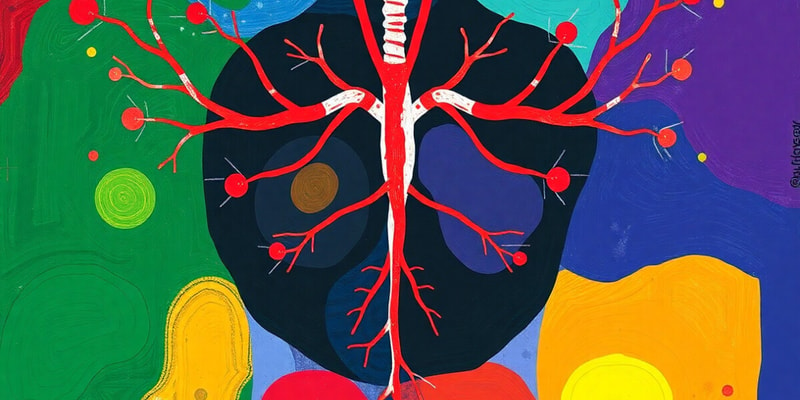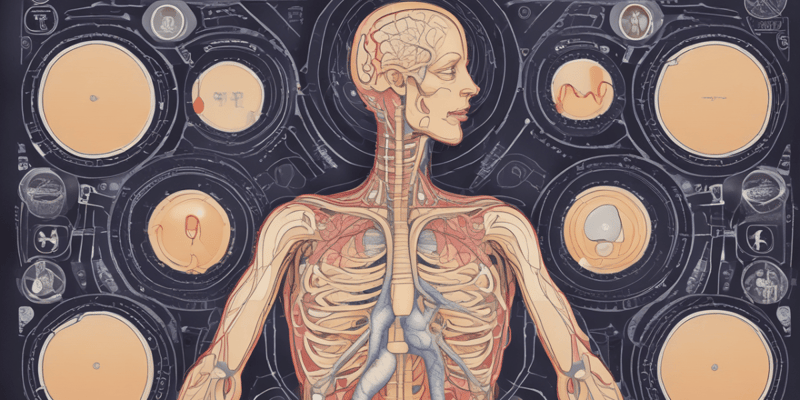Podcast
Questions and Answers
What is the primary hormone secreted by the pineal gland that aids in sleep regulation?
What is the primary hormone secreted by the pineal gland that aids in sleep regulation?
Which hormone from the pituitary gland stimulates the secretion of cortisol from the adrenal cortex?
Which hormone from the pituitary gland stimulates the secretion of cortisol from the adrenal cortex?
What condition is characterized by insufficient antidiuretic hormone (ADH), leading to extreme diuresis?
What condition is characterized by insufficient antidiuretic hormone (ADH), leading to extreme diuresis?
Which hormone increases the reabsorption of sodium and excretion of potassium in the kidneys?
Which hormone increases the reabsorption of sodium and excretion of potassium in the kidneys?
Signup and view all the answers
What is the primary effect of parathyroid hormone (PTH) in the body?
What is the primary effect of parathyroid hormone (PTH) in the body?
Signup and view all the answers
What is a common cause of Cushing's syndrome that results from prolonged steroid use?
What is a common cause of Cushing's syndrome that results from prolonged steroid use?
Signup and view all the answers
In Addison's disease, what electrolyte imbalance is commonly associated with the condition?
In Addison's disease, what electrolyte imbalance is commonly associated with the condition?
Signup and view all the answers
Which symptom is a characteristic of hyperthyroidism?
Which symptom is a characteristic of hyperthyroidism?
Signup and view all the answers
What severe complication can occur with untreated Addison’s disease during stress?
What severe complication can occur with untreated Addison’s disease during stress?
Signup and view all the answers
What is the main diagnostic test for confirming pheochromocytoma?
What is the main diagnostic test for confirming pheochromocytoma?
Signup and view all the answers
Which substance is essential for the production of thyroid hormones T3 and T4?
Which substance is essential for the production of thyroid hormones T3 and T4?
Signup and view all the answers
What distinguishes diabetes mellitus from diabetes insipidus?
What distinguishes diabetes mellitus from diabetes insipidus?
Signup and view all the answers
What is a classic sign of Cushing's syndrome?
What is a classic sign of Cushing's syndrome?
Signup and view all the answers
What is the first sign that may indicate kidney issues in a patient with hyperparathyroidism?
What is the first sign that may indicate kidney issues in a patient with hyperparathyroidism?
Signup and view all the answers
Which nursing problem is common in both hypoparathyroidism and hyperparathyroidism?
Which nursing problem is common in both hypoparathyroidism and hyperparathyroidism?
Signup and view all the answers
What blood glucose level indicates diabetes during a fasting blood glucose (FBG) test?
What blood glucose level indicates diabetes during a fasting blood glucose (FBG) test?
Signup and view all the answers
Which sign is associated with hypocalcemia and can be elicited by tapping the cheek?
Which sign is associated with hypocalcemia and can be elicited by tapping the cheek?
Signup and view all the answers
What is the primary treatment for diabetic ketoacidosis (DKA)?
What is the primary treatment for diabetic ketoacidosis (DKA)?
Signup and view all the answers
In patients with type 2 diabetes, what primarily causes insulin resistance?
In patients with type 2 diabetes, what primarily causes insulin resistance?
Signup and view all the answers
What should be monitored closely in patients receiving intravenous calcium gluconate for hypoparathyroidism?
What should be monitored closely in patients receiving intravenous calcium gluconate for hypoparathyroidism?
Signup and view all the answers
Which lifestyle change is recommended to prevent complications of metabolic syndrome?
Which lifestyle change is recommended to prevent complications of metabolic syndrome?
Signup and view all the answers
What is a common first symptom of reactive hypoglycemia?
What is a common first symptom of reactive hypoglycemia?
Signup and view all the answers
Which medication is recommended for a patient with nephropathy to control blood pressure?
Which medication is recommended for a patient with nephropathy to control blood pressure?
Signup and view all the answers
What is a major risk factor for developing type 2 diabetes related to lifestyle?
What is a major risk factor for developing type 2 diabetes related to lifestyle?
Signup and view all the answers
Which of the following best describes hyperosmolar hyperglycemic state (HHS)?
Which of the following best describes hyperosmolar hyperglycemic state (HHS)?
Signup and view all the answers
When should a patient with diabetes take insulin for best results?
When should a patient with diabetes take insulin for best results?
Signup and view all the answers
Study Notes
Endocrine System Overview
- The endocrine system consists of glands and organs that produce, store, and secrete hormones
- These hormones regulate various bodily functions, including body temperature, heart rate, and blood pressure.
- Nine major glands and organs are involved
- The system maintains homeostasis
Pineal Gland
- Also known as the "third eye" gland
- Secretes melatonin, a hormone influencing sleep, reproduction, and cancer prevention
Pituitary Gland (Hypophysis)
-
Controlled by the hypothalamus
-
Anterior lobe:
- Growth hormone (GH): Controlled by GHRH (releasing hormone) and GHIH/somatostatin; stimulated by the hypothalamus.
- Thyroid stimulating hormone (TSH): Stimulates thyroid gland growth and secretion, stimulated by TRH (thyrotropin-releasing hormone).
- Adrenocorticotropic hormone (ACTH): Stimulates cortisol and related hormone secretion from adrenal cortex, stimulated by CRH (corticotropin-releasing hormone).
- CRH: Released during exercise, stress, disease, or hypoglycemia
-
Posterior lobe:
- Antidiuretic hormone (ADH, or vasopressin): Increases water reabsorption in kidney tubules, decreasing urine output and maintaining blood pressure
Thyroid Gland
- Produces triiodothyronine (T3) and thyroxine (T4), regulating energy and metabolism. Requires iodine intake.
- Calcitonin, is produced in response to hypercalcemia. It reduces calcium absorption by bone and inhibits resorption of calcium, phosphorous from the blood.
- Thyroid gland abnormalities can lead to serious health issues (hyper/hypothyroidism
Parathyroid Gland
- Secretes parathyroid hormone (PTH), an antagonist to calcitonin, regulating blood calcium and phosphate levels
- PTH targets bone, small intestines, and kidneys
- PTH elevates blood calcium and lowers blood phosphate
Adrenal Glands
- Composed of adrenal cortex and adrenal medulla
- Adrenal cortex: Produces steroid hormones (mineralocorticoids, glucocorticoids, and gonadocorticoids)
- Mineralocorticoids (like aldosterone): Helps in maintaining blood volume/pressure by reabsorbing sodium and excreting potassium in the kidneys
- Glucocorticoids (e.g., cortisol): Regulate glucose metabolism, stress response, and immune function.
- Gonadocorticoids: Contribute to libido
- Adrenal medulla: Produces catecholamines (epinephrine/norepinephrine), involved in the "fight-or-flight" response.
Pancreas
- Plays crucial roles in both endocrine and exocrine functions.
- Secretes both insulin (beta cells), stimulating glucose uptake into body cells and glucagon (alpha cells) stimulated by hypoglycemia and increases glucose levels in bloodstream, through glycogen breakdown.
Studying That Suits You
Use AI to generate personalized quizzes and flashcards to suit your learning preferences.
Related Documents
Description
Explore the intricacies of the endocrine system, which consists of various glands that produce hormones vital for regulating bodily functions such as temperature, heart rate, and blood pressure. This quiz covers major components like the pineal and pituitary glands and their roles in maintaining homeostasis.




